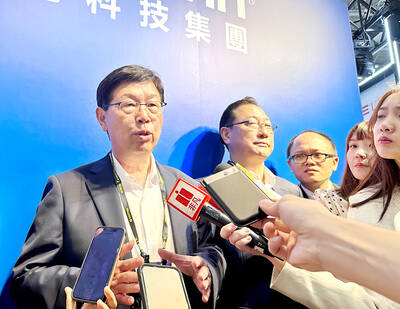India’s expected surge of rich consumers is driving the jewelry unit of Indian conglomerate Tata Group to triple its Zoya-branded luxury stores by 2027.
“There is a lot of latent demand for luxury from India and high-net-worth individuals are going to explode,” Ajoy Chawla, chief executive officer of the jewelry division at Titan Co, said in an interview. “This is just the beginning for luxury.”
Titan, India’s biggest jeweler, gets about 90 percent of its revenue from the sale of jewelry and the rest from watches, eyewear and perfumes. It has four jewelry brands under its umbrella: flagship Tanishq, working women-focused Mia, online sales portal Caratlane and Zoya, which is aimed at rich customers.
Expanding the number of Zoya stores to 15 in the next five years would cost about 300 million rupees (US$3.64 million) per boutique, Chawla said.
The company also plans to add Zoya galleries within select Tanishq stores, aiming to more than double those to as many as 15 by the end of next year, he said.
Revenue at the brand has climbed as much as five times from sales figures before the COVID-19 pandemic, and the company expects this “aggressive pace” of growth to continue, he said.
India is already the world’s second-biggest market for gold used in jewelry and demand is unlikely to waver with a report by Knight Frank showing the number of ultra-high-net-worth people with assets of US$30 million or more growing 11 percent last year from a year earlier.
That figure is expected to jump by about 39 percent in 2026, while individuals with wealth of at least US$1 million are forecast to surge by about 77 percent during the five-year period, the report said.
Titan is also aiming to ramp up overseas expansion in Zoya in a bid to build a global luxury brand.
“We have forayed overseas with Tanishq in the Middle East and US recently, and we will use that experience to plan a global move for Zoya,” Chawla said. “Ultimately, the plan is to create a global brand with an Indian soul.”

Taiwan Transport and Storage Corp (TTS, 台灣通運倉儲) yesterday unveiled its first electric tractor unit — manufactured by Volvo Trucks — in a ceremony in Taipei, and said the unit would soon be used to transport cement produced by Taiwan Cement Corp (TCC, 台灣水泥). Both TTS and TCC belong to TCC International Holdings Ltd (台泥國際集團). With the electric tractor unit, the Taipei-based cement firm would become the first in Taiwan to use electric vehicles to transport construction materials. TTS chairman Koo Kung-yi (辜公怡), Volvo Trucks vice president of sales and marketing Johan Selven, TCC president Roman Cheng (程耀輝) and Taikoo Motors Group

Among the rows of vibrators, rubber torsos and leather harnesses at a Chinese sex toys exhibition in Shanghai this weekend, the beginnings of an artificial intelligence (AI)-driven shift in the industry quietly pulsed. China manufactures about 70 percent of the world’s sex toys, most of it the “hardware” on display at the fair — whether that be technicolor tentacled dildos or hyper-realistic personalized silicone dolls. Yet smart toys have been rising in popularity for some time. Many major European and US brands already offer tech-enhanced products that can enable long-distance love, monitor well-being and even bring people one step closer to

RECORD-BREAKING: TSMC’s net profit last quarter beat market expectations by expanding 8.9% and it was the best first-quarter profit in the chipmaker’s history Taiwan Semiconductor Manufacturing Co (TSMC, 台積電), which counts Nvidia Corp as a key customer, yesterday said that artificial intelligence (AI) server chip revenue is set to more than double this year from last year amid rising demand. The chipmaker expects the growth momentum to continue in the next five years with an annual compound growth rate of 50 percent, TSMC chief executive officer C.C. Wei (魏哲家) told investors yesterday. By 2028, AI chips’ contribution to revenue would climb to about 20 percent from a percentage in the low teens, Wei said. “Almost all the AI innovators are working with TSMC to address the

FUTURE PLANS: Although the electric vehicle market is getting more competitive, Hon Hai would stick to its goal of seizing a 5 percent share globally, Young Liu said Hon Hai Precision Industry Co (鴻海精密), a major iPhone assembler and supplier of artificial intelligence (AI) servers powered by Nvidia Corp’s chips, yesterday said it has introduced a rotating chief executive structure as part of the company’s efforts to cultivate future leaders and to enhance corporate governance. The 50-year-old contract electronics maker reported sizable revenue of NT$6.16 trillion (US$189.67 billion) last year. Hon Hai, also known as Foxconn Technology Group (富士康科技集團), has been under the control of one man almost since its inception. A rotating CEO system is a rarity among Taiwanese businesses. Hon Hai has given leaders of the company’s six